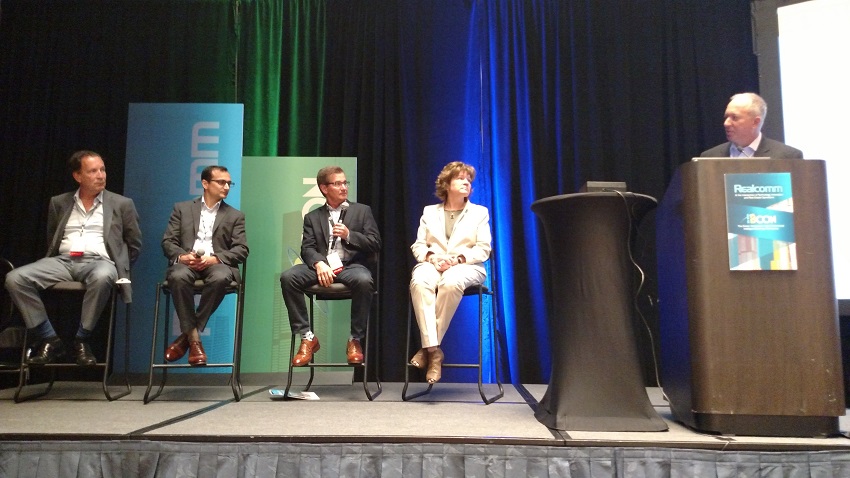
|
July 2017 |
[an error occurred while processing this directive] |
| Operations and Information
Technology Closing the Gap for Real Estate |
Brian Turner, President, OTI |
| Articles |
| Interviews |
| Releases |
| New Products |
| Reviews |
| [an error occurred while processing this directive] |
| Editorial |
| Events |
| Sponsors |
| Site Search |
| Newsletters |
| [an error occurred while processing this directive] |
| Archives |
| Past Issues |
| Home |
| Editors |
| eDucation |
| [an error occurred while processing this directive] |
| Training |
| Links |
| Software |
| Subscribe |
| [an error occurred while processing this directive] |
This year, I had the
pleasure of moderating a panel at the Realcomm IBCon conference in the
“Top of Mind” track. The session topic is one I’m confronted with often
as a master systems integrator, Operations and Information Technology,
Closing the Gap. It used to be that IT departments and building
operations had no reason to be in contact with one another – IT handled
all the networks, security and devices while operations focused on the
systems that were bolted to the buildings, like HVAC and lighting.
Recently, the “technology” part has become increasingly attached to the
operations side of the building, and the networking of building systems
will only continue to grow.

Smarter
building equipment, the increased adoption of building networks, IoT
and the expanding issues of cybersecurity and privacy are putting IT
and OT on a collision course. What I discussed with the panel of
experts – Sandeep Dave, Chief Digital and Technology Officer of Global
Workplace Solutions for CBRE; Maureen Ehrenberg, Executive Managing
Director of Integrated Facilities Management for JLL; Gerhard Karba,
CEO of IX-Strata; and Richard Newberry, CEO of KMC Controls – was the
notion that for both sides to succeed in the new world order,
collaboration is key. But where to begin?
First, we have to recognize that the business case for adopting OT
networking has already been made – there’s a reduction in cable, a
consolidation of servers and centralized security on both the physical
and network levels. All of this results in gains of valuable leasable
square footage for real estate professionals, while technology costs
continue to decline.
Plus, as we saw demonstrated at this year’s conference, there is a real
desire amongst building owners and managers to operate state-of-the-art
buildings with true next-generation capabilities. Just to name a few
innovative building operators, there’s General Growth Properties in the
retail space, Grupo CINSA and Reichman International in the commercial
office space, Infomart data centers, Ford Motor Company, Stanford
University, and Hudson Yards on the smart city front.
[an error occurred while processing this directive]
As the conversation shifts toward IT and OT convergence, it’s important
to keep in mind how they differ. IT’s bandwidth needs vary, while OT’s
remain fairly consistent over time. IT deals with customer and
transactional data while OT focuses on operational, often time-series
data. The biggest concern for IT when looking to manage an OT
network is the distributed architecture required, versus their
traditionally centralized networks.
With this in mind, I asked the Realcomm panel if they thought IT was
ready to take on support for OT, but more importantly if they even
should. A hearty debate arose. The only thing we could all agree on was
that a new working order needs to be established and that the train is
leaving the station either way. In order to keep everything moving
forward at its most optimally productive, there needs to be more
understanding about OT technologies across teams and throughout
processes.
Here are some other questions I challenge you to consider when minding
the gap between IT and OT: Is there a skills gap in the OT community?
Are IT and OT at odds because of internal power plays between CIOs and
COOs? What are the cultural differences between IT and OT? Can
organizations be agile enough to move successfully into the IoT? What
needs to happen to realize IT-OT convergence at scale, if convergence
is the goal?
The panelists from CBRE, JLL, IX-Strata and KMC Controls offered
intriguing perspectives on all of this. Let’s keep the conversation
going.
Looking for more of Brian's thoughts? Check this out?
About the Author
Brian
Turner is President of OTI, Operational Technology Integrators. He has
worked in the building automation industry for more than 20 years.
Today, Turner and his expert team of master systems integrators are
leading the charge to expand operational technology capabilities to
take advantage of the Industrial Internet of Things truly.
[an error occurred while processing this directive]
[Click Banner To Learn More]
[Home Page] [The Automator] [About] [Subscribe ] [Contact Us]